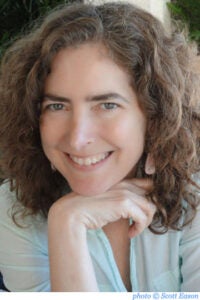Eugene Public Library 100 W. 10th St. Eugene, OR 97401
- Radio interview with KLCC, May 7: http://klcc.org/post/womens-stories-food-and-resilience-diana-abu-jaber
- Radio interview with Jefferson Public Radio, May 6: http://ijpr.org/post/diana-abu-jaber-large
American Book Award–winning author Diana Abu-Jaber will talk about and read from her work in the kick-off event of the 4th annual CSWS Northwest Women Writers Symposium. Her talk will focus on notions of struggle and resilience—especially for women, writers, and her own questing around cultural identity—as well as a certain amount of redemption through cooking. Dr. Abu-Jaber is the author of Arabian Jazz, Crescent, The Language of Baklava, Birds of Paradise, and Origins.
Diana Abu-Jaber was born in Syracuse, New York to an American mother and a Jordanian father. When she was seven, her family moved to Jordan for two years, and she has lived between the U.S. and Jordan ever since. Life was a constant juggling act, acting Arab at home but American in the street. The struggle to make sense of this sort of hybrid life, or “in-betweenness,” permeates Abu-Jaber’s fiction.
Her first novel, Arabian Jazz— considered by many to be the first mainstream Arab-American novel—won the 1994 Oregon Book award and prompted Jean Grant of The Washington Report on Middle East Affairs to say, “Abu-Jaber’s novel will probably do more to convince readers to abandon what media analyst Jack Shaheen calls America’s ‘abhorrence of the Arab’ than any number of speeches or publicity gambits.”
Her second novel, Crescent (W.W. Norton 2003), which was inspired by Shakespeare’s Othello, is set in contemporary Los Angeles and focuses on a multi-cultural love story between an Iraqi exile and an Iraqi-American chef. Lush and lyrical, suffused with the flavors and scents of Middle Eastern food, spiced with history and fable, Crescent is a sensuous love story as well as a gripping tale of commitment and risk. It won the PEN Center Award for Literary Fiction, the American Book Award, and has been published in eight countries to date.
Again using cuisine as the fulcrum of her narrative, Abu-Jaber’s next book—the culinary memoir The Language of Baklava (Pantheon, 2005) chronicles her own experiences growing up in a food-obsessed Arab-American family during the 1970’s and 80’s. Each chapter is developed around one of her father’s traditional Middle Eastern recipes. Entertainment Weekly described The Language of Baklava as being “as delectable for its stories as for its accompanying recipes...Diana Abu-Jaber concocts a feast of words and images from her Arab-American experience…[she] recounts a textured immigrant tale filled with heartfelt dishes...Rich, dense, and flavorful.”
Abu-Jaber’s book, Origin (WW Norton, 2008), a page-turner set in her childhood hometown of Syracuse, explores issues of memory and identity. Origin was named one of the best books of the year by the LA Times, the Chicago Tribune, and The Washington Post. Her most recent book is Birds of Paradise (WW Norton, 2011). Set primarily in Miami, it won the 2012 Arab American Book Award for Fiction.
 The symposium “Our Daily Bread: Women’s Stories of Food and Resilience” will take place on the University of Oregon campus and the downtown Eugene Public Library on Mother’s Day weekend, May 7 – 9, 2015. Diana Abu-Jaber (Crescent; Birds of Paradise) is the keynote author and will be joined by writers Novella Carpenter (Farm City: The Education of an Urban Farmer); scholar, activist, social justice novelist and editor Breeze Harper (Sistah Vegan; Scars); and poet Donna Henderson (The Eddy Fence), and magazine writer and educator Jennifer Burns Bright. For a full schedule go to: http://csws.uoregon.edu/events-2/2014-nwws/csws-northwest-women-writers-symposium-2015/. All events are free and open to the public. However, Saturday afternoon workshops are limited in size and require preregistration to guarantee a space, which you can do by calling Eugene Public Library at 541-682-5450 (Press 2).
The symposium “Our Daily Bread: Women’s Stories of Food and Resilience” will take place on the University of Oregon campus and the downtown Eugene Public Library on Mother’s Day weekend, May 7 – 9, 2015. Diana Abu-Jaber (Crescent; Birds of Paradise) is the keynote author and will be joined by writers Novella Carpenter (Farm City: The Education of an Urban Farmer); scholar, activist, social justice novelist and editor Breeze Harper (Sistah Vegan; Scars); and poet Donna Henderson (The Eddy Fence), and magazine writer and educator Jennifer Burns Bright. For a full schedule go to: http://csws.uoregon.edu/events-2/2014-nwws/csws-northwest-women-writers-symposium-2015/. All events are free and open to the public. However, Saturday afternoon workshops are limited in size and require preregistration to guarantee a space, which you can do by calling Eugene Public Library at 541-682-5450 (Press 2).
Sponsored by the UO Center for the Study of Women in Society. Cosponsors include Eugene Public Library; Oregon Humanities Center; UO Division of Equity and Inclusion; the UO Departments of Women’s and Gender Studies, English, and Ethnic Studies; UO School of Journalism and Communication; University Health Center; UO Libraries; Wayne Morse Center for Law and Politics; and the ASUO Women’s Center.


